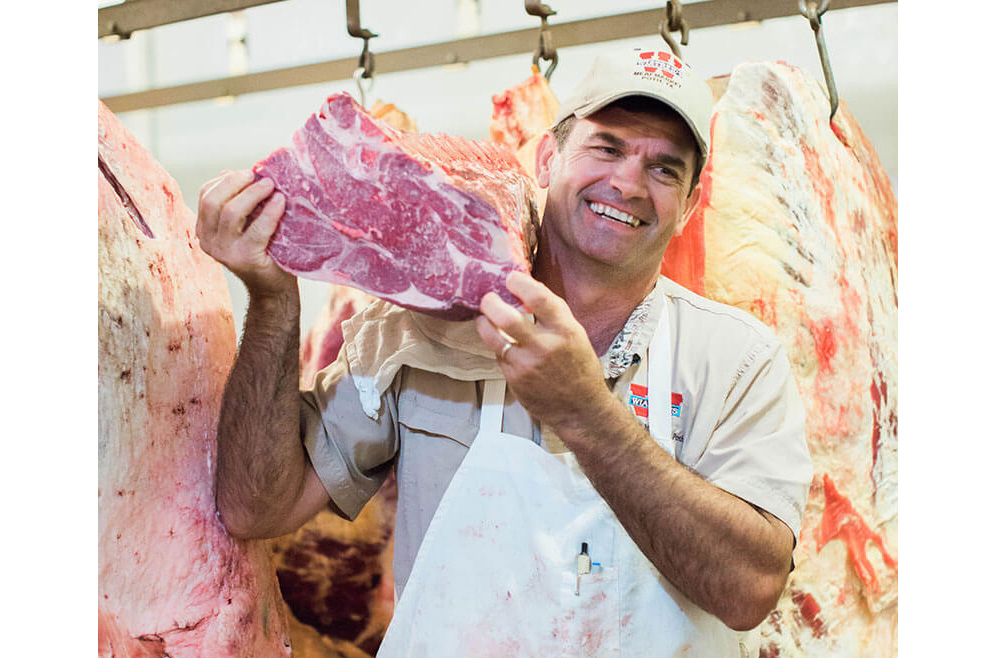By John McCurry/contributing writer
Even during a pandemic, holiday weekends in Texas are prime selling times for meat. Just ask Carter Ray, co-owner of Wiatrek’s Meat Market in Poth and San Antonio. 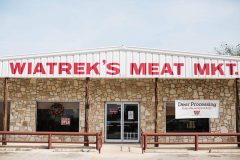
“Usually holiday weekends bring about 30 percent more business,” Ray told The Shelby Report a few days before Memorial Day. “That, added to the current state of things, we expect a very busy Memorial Day weekend.”
The current state of things refers to the ongoing COVID-19 pandemic, which has propelled grocery sales to new heights since March.
“Retail has been very busy, especially at the beginning of the pandemic,” Ray said. “Our wholesale business dropped off, but our custom processing picked up. People were ordering sides of beef, front quarters and hind quarters to fill their freezers—enough supply for six to eight months at a time, kind of like people used to do 25 years ago. That was busy. We had about 25 orders just in San Antonio to fill, and my dad had a lot in Poth to fill as well.”
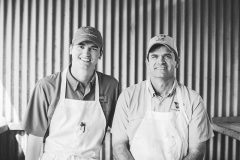
Carter Ray’s dad, Tom Ray, is the other co-owner. He runs the company’s original store in Poth, about 35 miles southeast of San Antonio. The duo purchased the Poth store from the Wiatrek family in 2006, after exiting the cattle business. The Ray family were dairy farmers for 110 years. Carter and Tom Ray opened the second Wiatrek’s location in San Antonio in 2018.
Stores have layouts like traditional meat markets. Ray says Wiatrek’s is by no means a gourmet or boutique store, but high-end products as well as more modestly-priced products are offered. All three grades of meat are offered.
Wiatrek’s has gone to great lengths to keep employees and customers safe during the pandemic. The stores have added sanitizer stations and air purifier units on the retail floors. Customers have not been required to wear masks, but most do. All employees wear masks and gloves. In addition to the recommended cleaning procedures, Ray is also considering adding disinfectant foggers and UV lighting.
“We are protecting ourselves,” Ray said. “We are wiping down door handles and glass surfaces with bleach. We wipe down our cutting room every day, trying to make it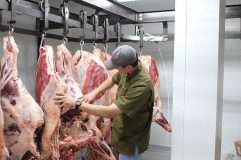 spotless before each day. My team has worked really hard trying to keep products on the shelves. Products take an hour to prepare and a few minutes to sell, so we try to get as much as we can done before we open. We limit customers to 10 in the store at a time and others have to wait outside until someone exits. We have signage to promote social distancing.”
spotless before each day. My team has worked really hard trying to keep products on the shelves. Products take an hour to prepare and a few minutes to sell, so we try to get as much as we can done before we open. We limit customers to 10 in the store at a time and others have to wait outside until someone exits. We have signage to promote social distancing.”
“Obviously, people are wanting to buy meat for their families, and right now they are trying to figure out how much food they need since they are adjusting to staying at home for three meals a day,” Ray said. “On the retail side, it’s been busy. We had to limit some items per family, but that was only temporary. For example, we limited hamburger meat to 10 pounds per family because we had a line outside the door, and we were limiting the number of people inside the store at any one time.”
In addition to the two stores, the Rays operate a state-inspected facility where they do custom processing of goats, lamb, hogs and cattle. They also have a nice business 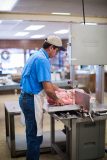 servicing restaurants. During normal times, they have 25 to 30 restaurant clients.
servicing restaurants. During normal times, they have 25 to 30 restaurant clients.
Wiatrek’s retail business slowed slightly in May prior to the run-up to Memorial Day weekend. Ray said price has been an issue throughout the crisis. Some meat markets haven’t stocked a wide variety of products because they don’t want to get stuck with a big inventory.
“Some distributors have been emptying out their freezers, trying to move their backup inventory,” Ray said. “We have been trying to find the balance. We may not get as much of a return on our investment on some items, such as brisket, but we feel we need to have them available. That has been the struggle, to find the best quality products and still be able to offer them at a reasonable price. Fresh meat, that has not been frozen, is out there, but it’s at a higher price. What we pay for meat has increased so our prices are higher, not because of gouging but because to get meat in has become expensive.”
Wiatrek’s buys live cattle from four local ranches. At the Poth store, Wiatrek’s serves 80 to 90 percent of its own cattle and cuts it fresh to order. Ray said that San Antonio uses about 50 percent of beef from its own cattle with the other 50 percent ordered from local suppliers. He said the climate around San Antonio requires a longer time to raise cattle and bring them up to weight, so the meat is leaner.
The stores also sell chicken and pork and create specialty products such as cured bacons. They smoke their own hams and sausages and make jerky. Ready-to-go appetizers are also available. Both stores offer custom cuts. Grilling accessories are also available, such as charcoal, lighter fluid and seasonings. There are also frozen items ranging from chicken nuggets to breaded wings to cow tongues.
Saturday is a special day at the Poth location. Meat lovers line up early to see what the Wiatrek’s pitmaster has prepared. The pitmaster arrives around 5 a.m. to start the fire box. All meats are seasoned and marinated the day before.
“We use mesquite wood to smoke and the pit he uses is located on the side of the store,” Ray said. “It’s about a 20- to 30-foot pit, and we load it with all sorts of protein such as split chicken, sausage, steaks, brisket, ribs, etc. We have joked in the past saying it is a ‘carne-copia’ of meat. We do not serve sides, just the meat. People drive from all over to grab lunch at the market and to load up for the week inside the store.”

